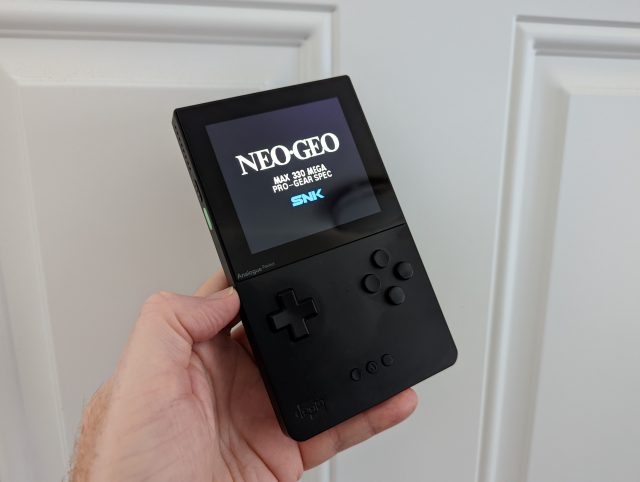
A major update to the portable, retro-minded Analogue Pocket gaming system landed on Friday, and its new "OpenFPGA" features are the highlight. Thanks to last week's "1.1" patch, anyone in the open source development community can build hardware-emulation "cores" to make Pocket mimic nearly any gaming and computer system up until the early '90s, if not newer than that.
Our chat with Analogue's CEO left us wondering exactly how OpenFPGA would work, but we didn't have to wait long to find out. By the end of Friday, the system was essentially "jailbroken" as far as its support of "Game Boy"-branded games was concerned. And things got even spicier on Monday morning with the surprise emergence of a core that supports a system far more powerful than either the Game Boy or Game Boy Advance.
Ladies and gentlemen... Pocket is floating in space
The physical cartridge slot on Analogue Pocket supports any game with Nintendo's Game Boy branding, up to the Game Boy Advance, and that's the obvious selling point for the system compared to something like an emulation box. If you're the kind of gamer who prefers physical media but wants modern hardware perks, Analogue Pocket is arguably the system for you.
Yet even owners of cartridges may prefer skipping physical media in some cases, especially to add convenience to a portable system, and that goes doubly for use cases like homebrew or Japanese games with community-developed English translations. Thus, since my Analogue Pocket review was published, interested buyers commented whether the system might receive a jailbreak—a way to skip physical cartridges and instead play ROM files loaded onto the system's microSD slot.
-
Every core working on Analogue Pocket as of press time. (We'll get to Neo Geo in a sec.)Sam Machkovech
-
GBA.
-
GBC.
Hours after my Pocket 1.1 article was published, the answer arrived in the form of a pair of downloads at GitHub. These files are cores for Pocket's OpenFPGA system, with one supporting Game Boy and Game Boy Color game files and the other supporting GBA game files. Put these cores into a microSD card, then put compatible game files into appropriate directories on the same card, and presto: Analogue Pocket will now play Game Boy-branded games, no cartridge required.
These files' origins are dubious; they appeared on a new GitHub account almost immediately after 1.1 went live—guaranteeing that its creators had some form of early access to Analogue's development environment prior to the launch. (The accounts refer to a pair of British psychedelia bands, Spacemen 3 and Spiritualized, which is certainly an interesting identifier.) One of the related accounts confirmed that it additionally had access to a slew of Pocket-formatted image files that had previously only been available to members of the press, designed to make the 1.1 update's "Library" system look nicer. The latter account did not identify itself beyond saying its owner is "an FPGA engineer," so it's unclear if these developers were part of the Analogue Pocket development process—though one claim that its cores had been "heavily tested for months" implies a very cozy relationship with Analogue as a company.
The biggest catch at this point is that these cores won't function without transferring "BIOS" files from Game Boy and GBA systems. When you use a cartridge on Analogue Pocket, you're playing these games with a BIOS file independently developed by Analogue—and that's the reason you don't see "Nintendo" or "Game Boy" splash screens before playing those games. (Those brief splash screens were part of Nintendo's original BIOS systems.)
Additionally, the new GB and GBA cores skip the coolest visual processing options built into Analogue Pocket, which exploit the high resolution of Pocket's panel to add LCD-style effects to its modern IPS screen. The anonymous developer behind these cores claimed that these filters would come to the GB, GBC, and GBA cores once "an API update from Analogue" goes live.
reader comments
57